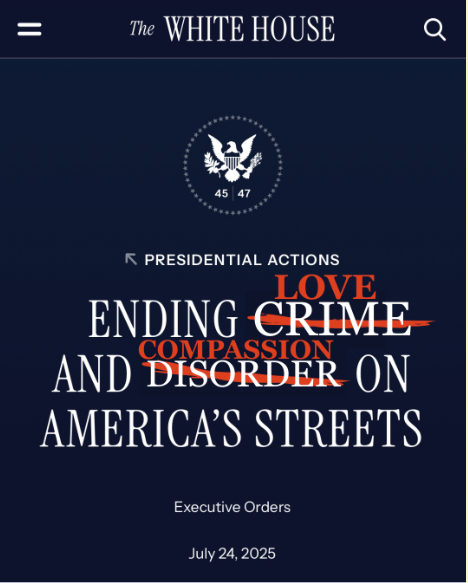
The Executive Order titled, “Ending Crime and Disorder on America’s Streets,” really ought to be called “Ending Love and Compassion on America’s Streets.” This order acts like arresting unhoused people is the solution to homelessness. It absolutely is not. Encampment sweeps rob people of their dignity and their possessions, without finding solutions to the problems that left them unhoused in the first place.
Our federal HUD and SAMHSA grants shouldn’t depend on whether we are punishing homeless people harshly enough. Our unhoused neighbors need love and support to better their lives. You can’t scare and punish them into finding housing– that’s not how it works. People need to be supported, not frightened, into achieving their goals.
Cities who refuse to abuse and frighten unhoused people shouldn’t be threatened with loss of federal funds. We are in a housing crisis. The Big Ugly Bill’s cuts to Medicaid, SNAP, and other needed programs will push many new people into homelessness. Those people will already be so frightened. The last thing they need is more policing. Our message to our unhoused neighbors must be loud and clear: being poor is not a crime. Being homeless is not a crime.
This executive order also calls for putting unhoused people into mental institutions without their consent. Many people know the beloved founder of GLIDE, Reverend Cecil Williams, experienced a severe mental breakdown as a child, driven in part by racial trauma in the segregated South. He recovered his mental health because of the loving support from his community. It is doubtful whether he could have recovered it in an institution influenced by medical racism.
This is why medical incarceration is not the answer to the mental health crises we see daily among our traumatized street populations. Violating people’s human and civil rights will not clean up our streets. A real plan to clean up the streets means investing in organizations like GLIDE and a network of services to address root causes and effectively support and house people.
Our Cecil Williams Community Ambassadors do trash pick-up, address concerns from local businesses, and compassionately refer our unhoused neighbors to the programs and services that will get them off the streets. To solve our country’s problems, we need to treat people like people. This executive order treats people like trash that needs to be thrown away.
More people are experiencing homelessness now than they have for decades. The cost of living is going up. Wages are going down. People are losing their healthcare. This is the wrong time to invest in punishment.
Unhoused people are not criminals. They include people who lost housing because our city is too expensive, women fleeing domestic violence, elders struggling to re-skill for today’s economy, and disabled people facing discrimination. Everyone’s got a story.
Of those that do have mental health or substance use issues, many of those are caused by the trauma of living in the street. This trauma is compounded when police pick up their tents and throw away their possessions.
As a city, as a state, and as a country, we need to stand for love, not judgment. Let’s not bow down or beg for those federal dollars; let’s stand tall, strong, and firm in our convictions. When we stand in our dignity, we also stand for the dignity of the people we serve. Let’s hope the leaders of the great state of California make a stand for love and compassion.
